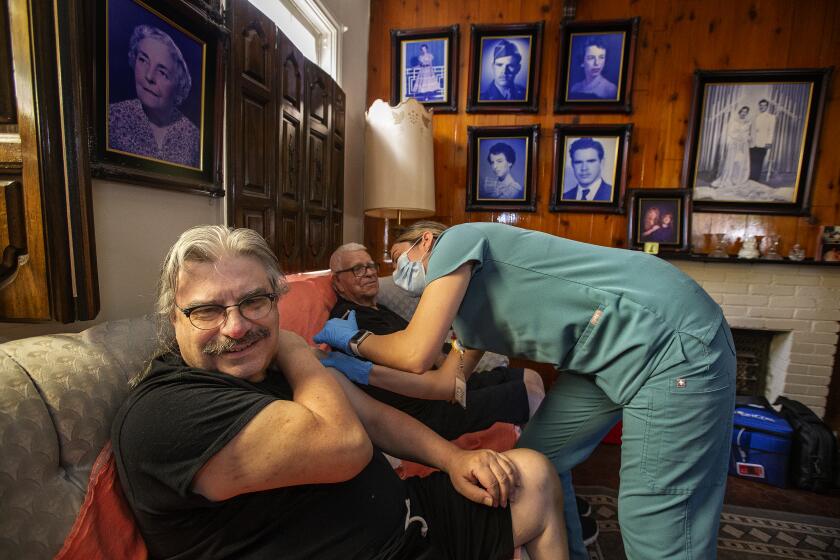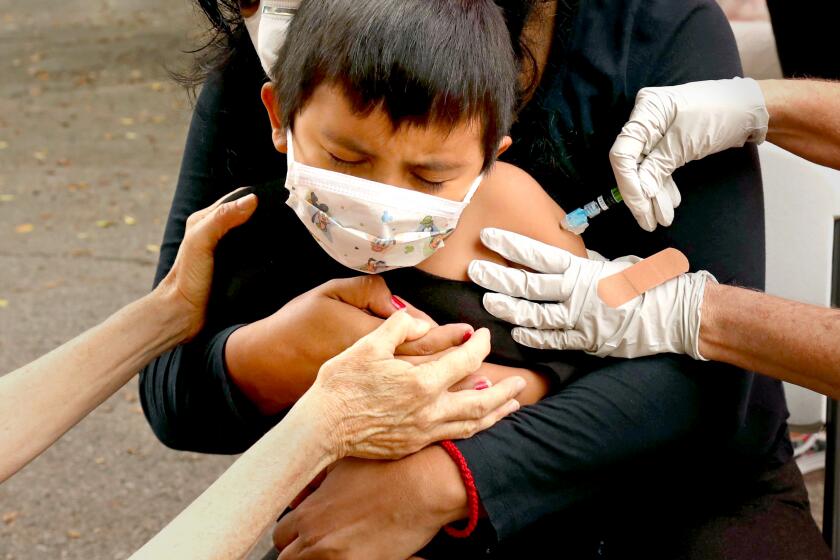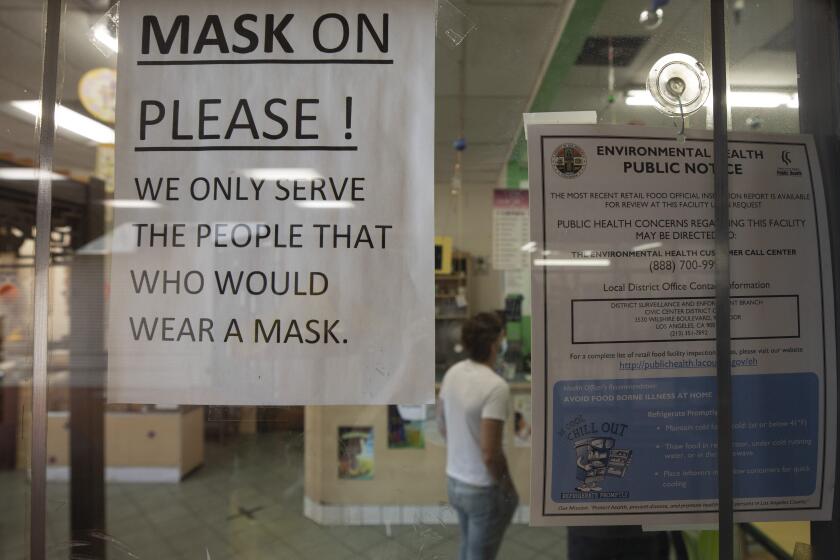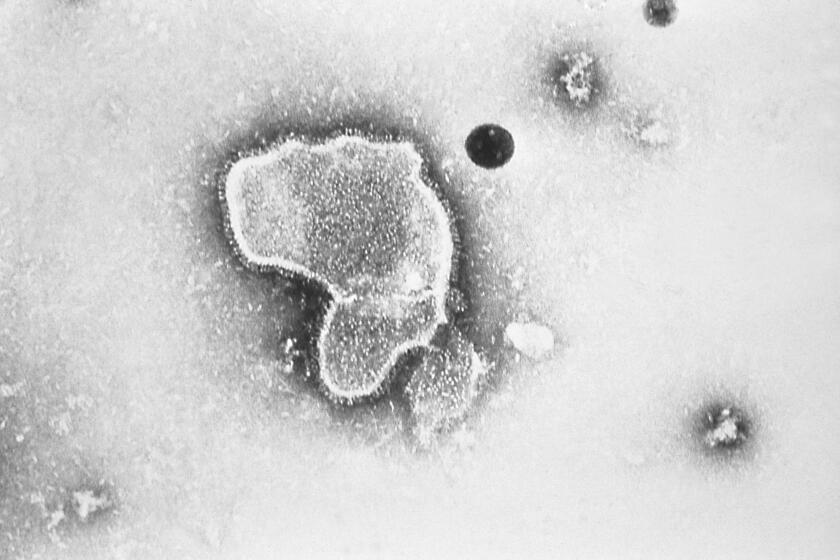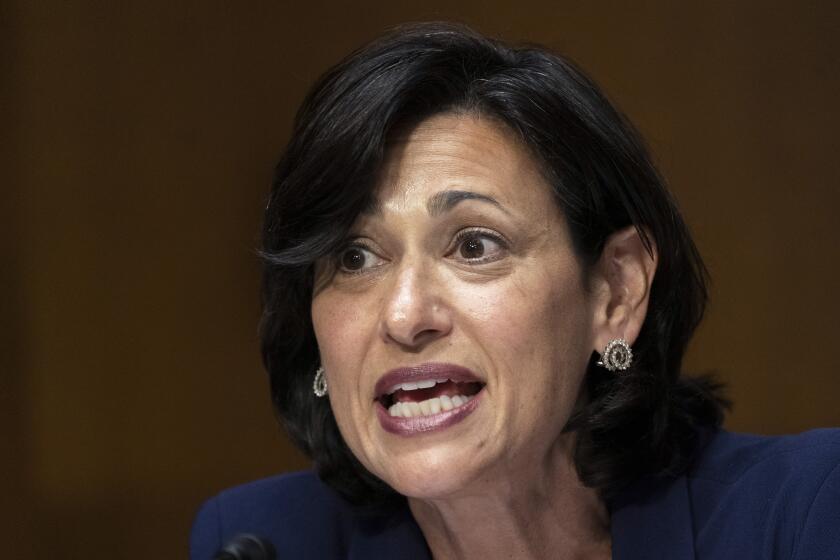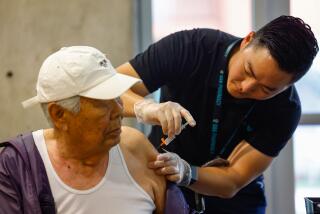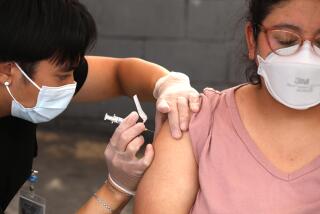Masking up, testing, sanitizing: Staying safe this Thanksgiving with COVID-19, flu and RSV
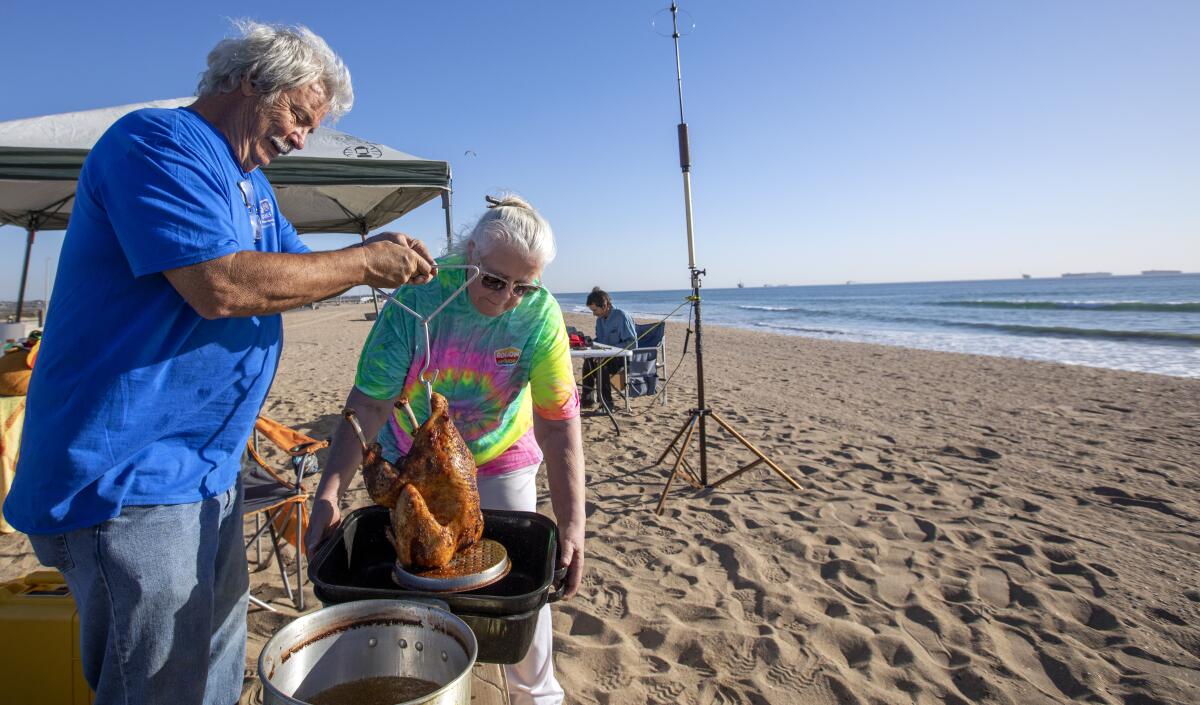
- Share via
Thanksgiving is right around the corner, bringing with it opportunities for festivities with family and friends.
But this year’s holiday happenings also risk attracting some unwelcome guests, as respiratory viruses and the coronavirus could find fertile ground to spread, especially in crowded indoor settings.
“Our winter virus season is here early, especially for our kids. We are seeing stress on our clinics and hospitals that care for kids, especially infants and kids under 12,” Dr. Tomás Aragón, California’s public health director and health officer, said recently. “It’s important to remember that kids get infected from other kids and adults, so everyone needs to do their part.”
While it’s impossible to eliminate the risk of catching COVID-19, the flu or RSV, health experts say there are several now-familiar steps that can be taken to boost protection.
“I know that I continue to look forward to this holiday and gathering with my mom and siblings and extended family and friends,” California Health and Human Services Secretary Dr. Mark Ghaly said. “And then I also think about, for the sake of our youngest Californians and other vulnerable Californians who could get severely sick after a respiratory illness, how important it is to gather in ways that might reduce risks of getting sick yourself or spreading infection to others.”
A confluence of respiratory illnesses has some California officials warning of a possible triple threat that could strain healthcare systems.
Get up to date on your shots
While there’s currently no vaccine for RSV — or respiratory syncytial virus, which can cause serious symptoms and even death in young children and older people — that’s not the case for the flu or COVID-19.
Annual flu shots have long been available. But for many residents, the COVID-19 pandemic may have interrupted the practice, especially given how atypically mild the last two flu seasons have been.
This time around, though, officials are expressing concern with the early and earnest arrival of the flu season. The illness has already reached levels not seen in years.
California Department of Public Health officials this week reported the season’s first death of a child younger than 5 due to flu and RSV.
“This tragic event serves as a stark reminder that respiratory viruses can be deadly, especially in very young children and infants,” Aragón said.
With the nation facing the earliest surge in flu cases in 13 years, the good news is that this season’s flu vaccine appears to be “a good match for the current strain,” said Dr. Matt Willis, health officer for Marin County.
Dr. Sarah Rudman, Santa Clara County’s deputy health officer, also said this week that “every type of flu vaccine, even when there’s a so-called mismatch between what’s circulating and what’s in the vaccine, provides a level of protection.”
Flu season’s positivity rate in Los Angeles County is at 25%, up from 13% a week ago, as RSV and COVID are still in circulation.
COVID-19 vaccines are also available. Officials in particular urge residents to take advantage of the updated bivalent booster, which targets the original coronavirus strain and the Omicron subvariants that have dominated the U.S. in recent months, including BA.5.
“The message to those coming into our household is to get the fall booster now. That goes for everyone over age 5,” Willis said. “We know the booster vaccine is working.”
However, uptake has been slow. Only a bit more than 13% of eligible Californians have rolled up their sleeves, state data show.
“I realize that many people are thinking that it’s too late to get vaccinated before Thanksgiving because the vaccines need time to be effective,” Los Angeles County Health Officer Dr. Muntu Davis said. “While protection does ramp up over one to two weeks after you are vaccinated, this doesn’t mean that you will have zero protection until this point. You still have some protection, and you will be prepared for future events.”
Willis said the risk of hospitalization in Marin County among those who have received the updated COVID-19 booster — which has been available since September — is five times lower than for those who haven’t gotten the new shot.
“And we’ve had no deaths among people who have received the fall booster,” Willis said.
Masking has returned to being “strongly recommended” in indoor public spaces in Los Angeles County. Coronavirus cases are rising across California.
Consider masking up
While it is no longer required in most settings, many health officials say that wearing a mask — especially in indoor public settings — can help limit the spread of germs.
L.A. County is again strongly recommending wearing a mask in indoor public spaces. The guidance is in response to recent increases in coronavirus transmission, although officials noted that masks can also stave off other respiratory illnesses.
“Masks will provide protection against RSV and flu the same way they provide protection against COVID transmission,” Davis said.
Willis said he’s asking family members who don’t normally mask up to do so in indoor public settings starting four days before his holiday gathering.
Wash your hands diligently
Although the coronavirus is primarily transmitted through the air, other viral illnesses can be contracted by touching contaminated surfaces and then touching your mouth or nose.
Regular hand washing can lessen the risk of such transmission. Willis said he’s asking family members to “double down on hand washing frequently for at least 20 seconds with soap and water.”
If you have to sneeze or cough, do so into your arm, elbow or a disposable tissue to avoid expelling respiratory droplets.
Viral infections, specifically RSV, push pediatric hospitalizations to record levels in Orange County, prompting a health emergency.
Maximize ventilation
Officials have long emphasized that outdoor gatherings are inherently less risky than those inside. Weather permitting, gathering in a backyard or on a patio makes sense.
However, for many, the arrival of colder months makes gathering outside an unattractive proposition. In these instances, experts say keeping doors and windows open as much as possible or using indoor air filters can help boost protection.
One way to keep an outdoor option viable could be to invest in a heating lamp.
Test the day of an event
For the coronavirus in particular, rapid testing remains a key tool in helping tamp down transmission. Officials say guests, even those who feel fine, should consider testing the day of an event to make sure they’re not infected.
Insured people in the U.S. can get reimbursed for eight at-home COVID tests per month for every person on their health plan. That means for an insured family of four, the family can claim as many as 32 at-home tests per month that are required to be reimbursed by health insurers. The reimbursement covers a maximum of $12 per test.
When purchasing at-home COVID tests, be aware that many brands sell two tests in each box.
Children younger than 6 months have faced the second-highest rate of COVID-19 hospitalization across all age groups, trailing only those ages 65 and up.
If you’re sick, stay home
This may be the most important, but hardest, ask.
More than 2½ years into the pandemic, the idea of missing a gathering with family and friends for any reason may seem like a deal-breaker. But showing up sick puts everyone at risk, even if you take precautions.
Don’t think that a negative coronavirus test gives you a free pass to attend a gathering if you have symptoms, either. You can test negative but still be visibly ill and contagious. And even if you don’t have COVID-19, you may have an illness you can still spread to others.
“It could be a heartbreaker, but we’re asking people if they do have symptoms to stay home because it’s a simple and effective way to not spread illness at a holiday dinner,” Willis said.
More to Read
Sign up for Essential California
The most important California stories and recommendations in your inbox every morning.
You may occasionally receive promotional content from the Los Angeles Times.
